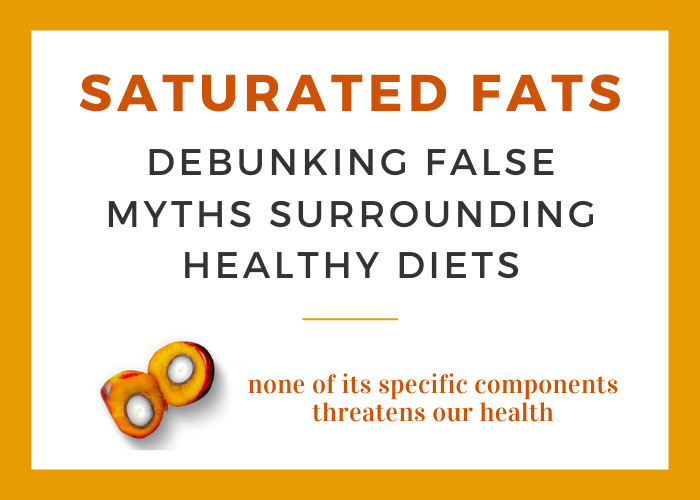Are saturated fats harmful?ROUNDTABLE "SATURATED FATS: DEBUNKING THE MYTHS"
- 23 March 2022
- Posted by: Competere
- Categories: events, highlights, News, Sustainable Nutrition

On March 22nd, Competere hosted a roundtable to provide the audience with a different perspective on saturated fats, which are often disparaged and accused of causing various diseases.
ARE SATURATED FATS HARMFUL? COMPETERE DEBUNKS FALSE MYTHS SURROUNDING HEALTHY DIETS
Palm oil under inquiry: none of its specific components threatens our health
Rome, March 22, 2022 – Are saturated fats really harmful to health? After many food producers and transformers are returning back to palm oil given the sudden shortage of sunflower oil, consumers and policy makers are eager to understand the impact of saturated fats on their daily diet. Indeed, palm oil was replaced because it bears a certain presence of saturated fats. The use of claims such as “palm oil free” or “low in saturated fats” are used to convince or conceive the consumer that the product with no palm oil is healthier.
Answers to this question were put forward by the roundtable Saturated Fats, debunking the myth, organized by Competere – the European think tank committed to developing sustainable policy ideas and owner of the largest scientific discussion platform on Sustainable Nutrition.
The panel featured Francesco Visioli, Professor in Human Nutrition at the University of Padova, Dr. Kalyana Sundram, consultant for CPOPC – Council of Palm Oil Producing Countries with over 40 years of experience in the field of oils and fats properties, as well as the Founder and President of Competere Pietro Paganini.
The discussion highlighted the need to assess the complexity of the landscape of unsaturated fatty acids, a very heterogeneous category that spans a variety of metabolic effects. In this way, the speakers have debunked the theory that includes the entire category of saturated fats as harmful to health because of their effect on LDL cholesterol concentrations, the most important cardiovascular risk factor, which are born of a generalization regarding saturated fats of animal origin.
“In Italy and Europe, the largest proportion of dietary saturated fat is actually derived from dairy products, whose consumption has neutral or moderately beneficial effects on cardiovascular diseases, while meat-rich diets in other countries complicate the possibility of isolating the properties of these components from food as a whole. After decades of research, we can conclude that consuming saturated fats within a balanced diet has no harmful effects on health and that further studies are needed to clarify the physio-pathological properties of this category” – said Prof. Francesco Visioli.
Such evidence is deeply important in the current context, characterized by a strong tension in the market of raw food materials that has led many businesses to go back to palm oil, previously replaced by sunflower oil due to its contribution in terms of saturated fatty acids. Scientific literature has shown that there are no specific components of palm oil able to produce negative effects on health, and that it has a neutral effect on cholesterol metabolism. These findings have been further confirmed by the Istituto Superiore di Sanità (ISS) and CREA – Centro di Ricerca Alimenti e Nutrizione (Food and Nutrition Research Center), which have underlined how the contribution of palm oil to the intake of saturated fatty acids is marginal and, above all, how it is conceptually wrong to label a food as positive or negative without framing it in the context of a full diet.
“We should be geared toward ensuring an ethical approach to nutrition, looking at what’s best for the consumer. Let’s dispel myths like that of the inherent harmfulness of cholesterol: its concentration in the blood is minimally dependent on diet and it is important for our metabolic function. Or that on saturated fats, whose concentration in many foods has been lowered to attract consumers. That’s why companies have abandoned palm oil, but now we have scientific evidence to say that from a nutritional point of view the fats it contains are not bad per se: we must always talk about quantity and quality of food” – said Dr. Kalyana Sundram.
“The discussion on saturated fats leads us to debunk myths that, for ideological or commercial issues, too often confuse consumers, leading to contradictions such as those we see these days related to the return to palm oil. Research has confirmed that there are no scientific elements that condemn palm oil: any attempt to label it as good or bad tout court take us farther from providing consumers with serious, reliable and scientifically proven information to choose their diet in a sustainable way” – says Pietro Paganini, President and Founder of Competere.

